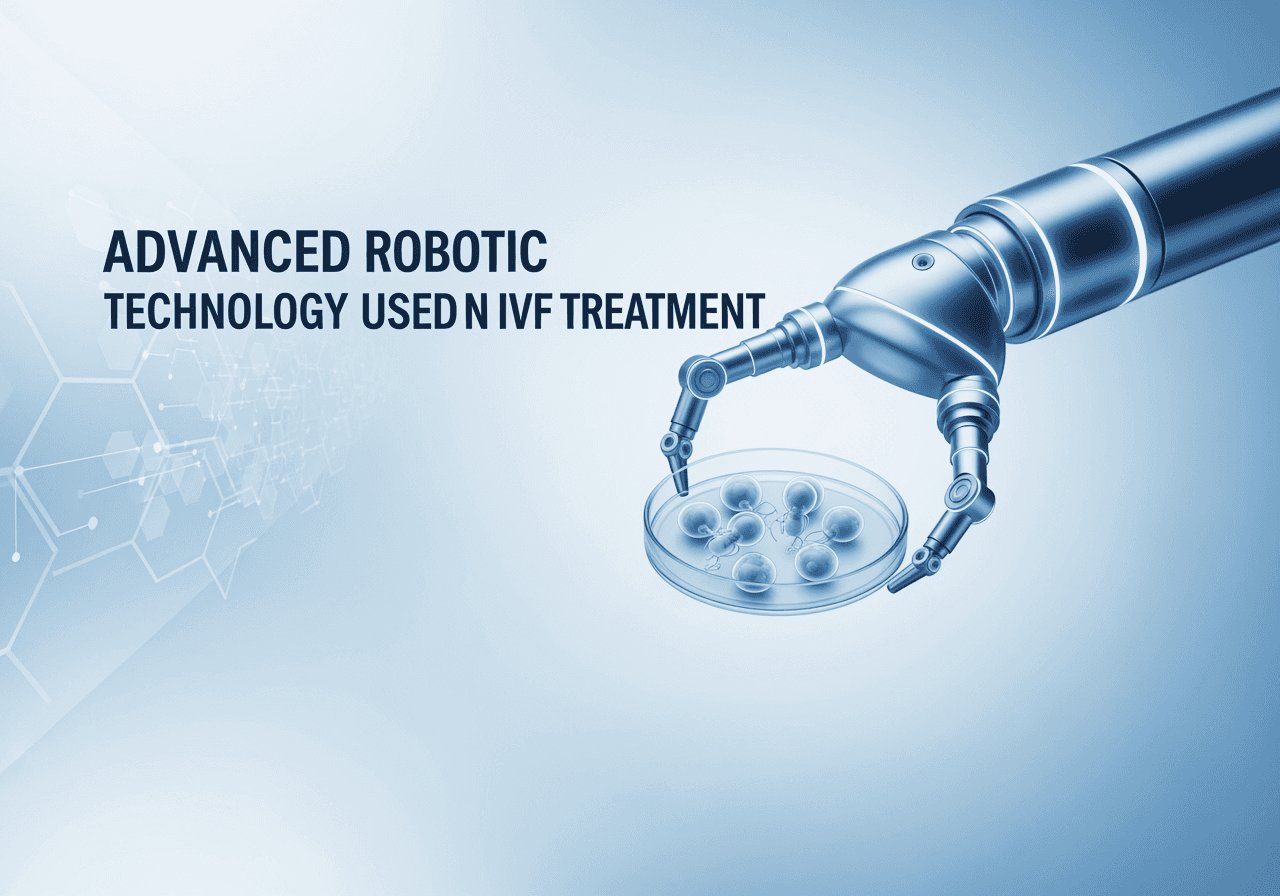
Advanced Robotic Technology Used in IVF Treatment
29 Oct, 2025
 Healthtrip
HealthtripThe Rise of Robotics in IVF
Precision and Accuracy
Robotic systems in IVF are redefining the meaning of precision. Imagine a process where the selection of sperm and the manipulation of delicate embryos are performed with a level of accuracy human hands simply can't match. These robotic arms, guided by sophisticated software and expert embryologists at hospitals like Fortis Hospital, Noida, and Saudi German Hospital Cairo, Egypt, can identify the healthiest sperm with greater efficiency, leading to a higher chance of successful fertilization; furthermore, the technology minimizes the risk of damage during procedures such as intracytoplasmic sperm injection (ICSI), where a single sperm is injected directly into an egg, ensuring the genetic material is delivered perfectly, improving fertilization rates, and overall IVF success and ultimately, it is like having a microscopic surgeon with unwavering hands, performing the most crucial steps with the utmost care and as Healthtrip, we will guide to the best hands with experience in robotic surgery.
Most popular procedures in India
Automation and Efficiency
Time is of the essence in IVF. Robotic automation streamlines the entire process, reducing the time it takes to perform critical tasks and minimizes the potential for human error, imagine a lab where robotic systems automatically monitor and adjust the environment for optimal embryo development, meticulously feeding and caring for these precious cells around the clock with consistency, this automation not only improves efficiency but also ensures a stable and nurturing environment, leading to healthier embryos and a higher likelihood of implantation. Facilities like Vejthani Hospital in Bangkok and Quironsalud Hospital Murcia are integrating these automated systems to provide their patients with a seamless, efficient, and stress-free IVF experience which is why Healthtrip is here, to make sure this process is streamlined based on your personal convenience and needs, and we ensure that our services are cost-effective, so you can save thousands of dollars.
Specific Robotic Technologies in IVF
Automated Sperm Selection
Finding the perfect sperm is like finding a needle in a haystack, however, advanced robotic systems are making this task easier and more effective than ever before, these systems use sophisticated imaging and algorithms to analyze sperm morphology, motility, and DNA fragmentation, identifying the healthiest and most viable candidates for fertilization, furthermore, imagine a scenario where a robotic arm gently sorts through millions of sperm, selecting only those with the highest potential, increasing the chances of successful fertilization and healthy embryo development. Clinics such as Memorial Bahçelievler Hospital in Istanbul and NMC Specialty Hospital, Al Nahda, Dubai, are utilizing these technologies to enhance their sperm selection process, ensuring that only the best sperm are used in IVF and for Healthtrip, we want to make sure that those best sperms have a higher potential to be implanted in a healthy environment.
Wellness Treatments
Give yourself the time to relax
Lowest Prices Guaranteed!

Lowest Prices Guaranteed!
Robotic Embryo Biopsy
Preimplantation Genetic Testing (PGT) is a crucial step in IVF, allowing embryologists to screen embryos for genetic abnormalities before implantation, however, traditional embryo biopsy methods can be delicate and potentially damaging, enter robotic embryo biopsy, with robotic precision, these systems can remove a few cells from an embryo with minimal disruption, thanks to facilities such as LIV Hospital, Istanbul, and Jiménez Díaz Foundation University Hospital in Madrid are at the forefront of this technology, ensuring the safety and integrity of the embryos during PGT, therefore, robotic assistance minimizes the risk of damage, leading to healthier embryos and improved implantation rates and we at Healthtrip aim to make this a safer option for you and we will go to great lengths to ensure you are in great care.
Benefits of Advanced Robotic IVF Technology
Improved Success Rates
The ultimate goal of IVF is a healthy pregnancy and advancements in robotic technology are significantly improving the chances of success, the increased precision in sperm selection, embryo manipulation, and implantation leads to higher fertilization rates, healthier embryos, and improved implantation rates, clinics using robotic systems are reporting higher pregnancy rates and lower miscarriage rates compared to traditional IVF methods and hospitals like Bangkok Hospital and Fortis Memorial Research Institute, Gurgaon, are showcasing the positive impact of robotic technology on IVF success and we at Healthtrip care about your success and that will be our top priority, and furthermore, we can ensure that the facilities we provide are cost-effective and have a low risk.
Reduced Risk of Complications
While IVF is generally safe, there are inherent risks associated with the procedures, robotic technology minimizes these risks by enhancing precision and reducing the potential for human error, this means less trauma to the embryos during manipulation, lower risk of infection during procedures, and a more controlled and stable environment for embryo development, facilities like BNH Hospital in Bangkok and Saudi German Hospital Dammam are leveraging robotic technology to provide their patients with a safer and more comfortable IVF journey, and at Healthtrip, we will further do our best to make sure your trip is as fulfilling as possible.
Future Trends in Robotic IVF
Artificial Intelligence Integration
The future of robotic IVF is intertwined with the rise of Artificial Intelligence (AI), AI algorithms can analyze vast amounts of data to optimize every step of the IVF process, from predicting the best sperm for fertilization to identifying the most viable embryos for implantation. Imagine AI-powered robots that can learn and adapt to individual patient needs, personalizing the IVF process for optimal outcomes and clinics like Mount Elizabeth Hospital in Singapore and Helios Klinikum Erfurt are exploring the potential of AI integration to further enhance the precision and efficiency of robotic IVF, and AI integration will make sure that robotic machines learn the best method without human intervention and Healthtrip will be the first step towards a better future of medical tourism.
Tele-Robotics and Remote Procedures
Tele-robotics is another exciting frontier in IVF, this technology allows embryologists to perform procedures remotely, potentially expanding access to specialized care for patients in underserved areas, imagine a scenario where an expert embryologist in one location can guide a robotic system in another location, performing delicate procedures with precision and accuracy thanks to hospitals such as Cleveland Clinic London and Quironsalud Hospital Toledo envision breaking down geographical barriers and providing world-class IVF care to anyone, anywhere and as Healthtrip, we will give you the opportunity to experience the possibilities, wherever you are in the world.
Finding the Right Clinic for Robotic IVF
Accreditation and Experience
When considering robotic IVF, it's crucial to choose a clinic with proper accreditation and extensive experience in the technology, look for clinics that have a proven track record of success and are staffed by skilled embryologists and technicians trained in robotic procedures. Facilities like Singapore General Hospital and Taoufik Hospitals Group, Tunisia, are recognized for their expertise in robotic IVF, and Healthtrip ensures that our partners have accreditation and will make sure that you are in experienced hands for a successful operation, and we will guide you through the entire process of the surgery.
Comprehensive Support and Care
IVF is an emotional journey and it's essential to choose a clinic that provides comprehensive support and care throughout the entire process, look for clinics that offer counseling services, patient education programs, and personalized treatment plans thanks to hospitals from the likes of NMC Royal Hospital, DIP, Dubai, and London Medical, they believe that a holistic approach can make a significant difference in the IVF experience and furthermore, we understand that this journey can be complex, so Healthtrip offers end-to-end support, connecting you with the right specialists and ensuring that your experience is as smooth and stress-free as possible, we will also help you get medical visa assistance, to ensure that your travel to the country of your choice is worry-free.
Where is Robotic IVF Available?
Robotic IVF is an exciting frontier in reproductive technology, and while it's not yet as widespread as traditional IVF, it's becoming increasingly accessible in certain parts of the world. The availability of robotic IVF depends on several factors, including technological advancements, regulatory approvals, and the willingness of fertility clinics to invest in this cutting-edge equipment. Currently, you can find clinics offering robotic IVF in Europe, Asia, and the Middle East. For example, some facilities in Turkey are beginning to explore robotic assistance in IVF procedures. While we don’t have specific robotic IVF availability information for all hospitals Healthtrip partners with, it’s worth reaching out to clinics like LIV Hospital, Istanbul, or Memorial Sisli Hospital in Turkey, to inquire about their adoption of robotic technologies in their fertility treatments. Remember, it's always best to check directly with the clinics to confirm if they offer robotic IVF and to understand their specific approach and expertise in this area. The field is rapidly evolving, so keep an eye on advancements happening globally! Your dream of parenthood might just get a little technological boost.
Why Use Robotics in IVF Treatment?
Why would anyone want robots involved in something as delicate as IVF? Well, the answer lies in the quest for greater precision, consistency, and ultimately, improved success rates. Imagine a surgeon's steady hand, but amplified and refined by advanced technology. That's the potential of robotics in IVF. Human hands, no matter how skilled, can be subject to slight variations due to fatigue, tremors, or even just the inherent limitations of manual dexterity. Robotics, on the other hand, offers the possibility of performing intricate tasks with micrometer-level accuracy, reducing the risk of human error during critical stages of the IVF process, such as egg retrieval and embryo injection. The use of robotics could lead to minimizing damage to eggs and embryos, potentially increasing the chances of successful fertilization and implantation. Moreover, robotics can standardize procedures, ensuring that each patient receives the same high level of care and precision, regardless of the time of day or the individual embryologist performing the procedure. While it's not about replacing human expertise, it's about enhancing it with the power of technology to give hopeful parents the best possible chance of realizing their dreams.
How Does Robotic IVF Work?
Robotic IVF isn't about replacing human embryologists with metallic automatons. Instead, it's about equipping these skilled professionals with advanced tools that enhance their capabilities and improve the precision of certain IVF procedures. The core concept involves using robotic systems to perform delicate tasks that require extreme accuracy, stability, and control, such as intracytoplasmic sperm injection (ICSI), where a single sperm is injected directly into an egg. These robotic systems typically consist of micro manipulators, high-resolution imaging systems, and sophisticated software that allows embryologists to precisely control the movement of instruments at a microscopic level. The embryologist remains in control, guiding the robot's actions through a user interface, but the robot provides increased stability, precision, and dexterity. Before the robotic system comes into play, the initial steps of IVF, such as ovarian stimulation and egg retrieval, are generally performed using traditional methods. Once the eggs are retrieved, they are prepared for robotic ICSI, where the robot carefully picks up a sperm and injects it into the egg. The fertilized eggs are then monitored for development, and the best embryos are selected for transfer to the woman's uterus. Ultimately, robotic IVF aims to refine the most critical steps of the IVF process, improving the chances of successful fertilization and pregnancy.
Also Read:
Specific Robotic Technologies Used in IVF
Robotic IVF is not about replacing embryologists with humanoid robots, at least not yet! Instead, it involves highly specialized robotic systems that enhance precision and efficiency in specific IVF procedures. One of the most notable technologies is robotic microinjection, often used in Intracytoplasmic Sperm Injection (ICSI). ICSI is a technique where a single sperm is directly injected into an egg to facilitate fertilization. Traditionally, this is performed manually by skilled embryologists using microscopes and micromanipulators. Robotic ICSI employs automated microinjection systems that can perform this delicate task with greater precision, consistency, and speed. These systems use advanced imaging and robotic arms to select the best sperm and inject it into the egg. The robotic arm is controlled by the embryologist, who guides the process while benefiting from the increased stability and reduced human error that the system provides. This can lead to higher fertilization rates and improved embryo quality.
Another area where robotics plays a significant role is in embryo biopsy for Preimplantation Genetic Testing (PGT). PGT involves removing a few cells from an embryo to test for genetic disorders before implantation. This procedure requires extreme accuracy to avoid damaging the embryo. Robotic biopsy systems use laser technology and precise robotic arms to carefully extract the cells, minimizing the risk of harm. The embryologist controls the laser and robotic arm, ensuring the procedure is performed with the utmost care. Robotic systems also aid in embryo vitrification (freezing) and thawing. Precise temperature control and handling are crucial to maintain embryo viability during these processes. Automated systems can ensure consistent and accurate vitrification and thawing, improving the chances of successful implantation after the embryos are transferred back into the uterus. Clinics such as NewGenIvf Group, Hon Kong and First Fertility Bishkek, Kyrgyzstan are investing in these types of technologies.
Also Read:
Benefits of Robotic IVF Treatment
Robotic IVF offers several potential advantages over traditional methods, making it an appealing option for couples struggling with infertility. One of the primary benefits is increased precision and accuracy. Robotic systems can perform delicate procedures like ICSI and embryo biopsy with a level of precision that is difficult to achieve manually. This can lead to higher fertilization rates, improved embryo quality, and reduced risk of damage to the embryos. Consistency is another key advantage. Human error can be a significant factor in manual IVF procedures. Embryologists, like anyone, can experience fatigue or slight variations in technique, which can affect the outcome. Robotic systems, on the other hand, perform tasks with consistent precision every time, reducing variability and improving reliability. Some clinics such as Memorial Sisli Hospital and Vejthani Hospital strive to ensure consistent results by using robotic technology.
Robotic IVF can also improve efficiency. Automated systems can perform certain tasks more quickly than manual methods, allowing embryologists to focus on other critical aspects of the IVF process. This can lead to faster turnaround times and increased throughput for IVF clinics. Furthermore, robotic systems can reduce the physical strain on embryologists. Manual IVF procedures can be demanding and require long hours of focused work. Robotic assistance can alleviate some of this strain, potentially improving the well-being and longevity of embryologists. This, in turn, can contribute to a more stable and experienced IVF team. By minimizing errors and physical strain, robotic IVF has the potential to improve overall success rates and provide a more reliable and efficient path to parenthood.
Also Read:
Success Rates of Robotic IVF
Evaluating the success rates of robotic IVF requires careful consideration. While the technology holds promise, it’s essential to understand that success rates can vary depending on several factors, including the clinic's expertise, the patient's age and health, and the specific robotic system used. Some studies have shown that robotic ICSI can lead to higher fertilization rates compared to manual ICSI. This improvement may be particularly noticeable in cases where the sperm quality is suboptimal or when dealing with fragile eggs. However, it’s important to note that higher fertilization rates don't always translate directly into higher pregnancy rates. The quality of the resulting embryos and the overall health of the patient also play crucial roles. Clinics like Bangkok Hospital and Memorial Bahçelievler Hospital are often at the forefront of exploring and tracking success rates with new technologies.
Data on pregnancy rates and live birth rates following robotic IVF are still emerging. Some studies suggest that robotic assistance can improve these outcomes, particularly in specific patient populations. For example, robotic biopsy for PGT may lead to higher implantation rates by minimizing damage to the embryos. Similarly, precise vitrification and thawing procedures can improve embryo survival rates, increasing the chances of successful implantation. However, more extensive research is needed to confirm these findings and to determine the long-term impact of robotic IVF on reproductive outcomes. When considering robotic IVF, it's crucial to discuss success rates and potential benefits with your fertility specialist. They can provide personalized information based on your individual circumstances and the specific technologies available at their clinic. While robotic IVF is not a guaranteed solution for infertility, it can be a valuable tool in the hands of skilled embryologists, further enhancing the chances of a successful pregnancy.
Also Read:
Conclusion
Robotic IVF represents an exciting frontier in reproductive medicine, offering the potential to enhance precision, consistency, and efficiency in various IVF procedures. While not a complete replacement for the expertise of embryologists, robotic systems can augment their skills and reduce the risk of human error, potentially leading to improved fertilization rates, embryo quality, and overall success rates. As research continues and technology advances, robotic IVF is likely to play an increasingly significant role in helping couples overcome infertility challenges. If you're considering IVF treatment, discuss the potential benefits of robotic assistance with your fertility specialist to determine if it's the right option for you. Healthtrip is here to assist you in finding the best clinics and specialists to guide you on your journey to parenthood.
Related Blogs

Long-Term Follow-Up After Eye Surgery
Detailed insights into eye surgery – doctors, hospitals, technology, recovery,

Healthtrip’s Transparency in Eye Surgery Pricing and Packages
Detailed insights into eye surgery – doctors, hospitals, technology, recovery,

Frequently Asked Questions About Eye Surgery
Detailed insights into eye surgery – doctors, hospitals, technology, recovery,

Advanced Robotic Technology Used in Eye Surgery
Detailed insights into eye surgery – doctors, hospitals, technology, recovery,

How Healthtrip Supports Foreign Patients for Eye Surgery in India
Detailed insights into eye surgery – doctors, hospitals, technology, recovery,

Top Medical Packages for Eye Surgery Offered by Healthtrip
Detailed insights into eye surgery – doctors, hospitals, technology, recovery,










